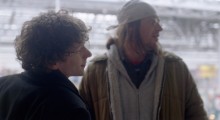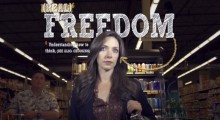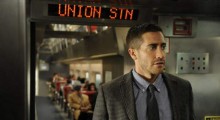David Foster Wallace
-
The Anxiety of Influence: Director James Ponsoldt on The End of the Tour

“Am I a good person? Deep down, do I even really want to be a good person, or do I only want to seem like a good person so that people (including myself) will approve of me? Is there a difference? How do I ever actually know whether I’m bullshitting myself, morally speaking?” – David Foster Wallace The new tagline for the James Ponsoldt movie The End of the Tour is, “Imagine the greatest conversation you’ve ever had.” I initially took issue with this tagline. Ponsoldt’s film is based on a book arranged around a transcript of an unpublished interview […]
by Alicia Van Couvering on Jul 23, 2015 -
Director James Ponsoldt on his David Foster Wallace Drama, The End of the Tour

Are you one to meet your heroes? By reading, watching, listening to their work, do you feel a connection to them? Or are they enigmas whose mysteries you need to crack? In the world of contemporary letters, few figures loom as large as David Foster Wallace, whose sprawling, wickedly funny, fiercely observant works grappled with both the necessity and near impossibility of sincere, non-ironic expression in the age of commodified mass media and a meaningless public discourse. In essays about punctuation and cruise ships, tennis stars and cooked lobsters, and in stories and novels including his protean cultural phenomenon, Infinite […]
by Scott Macaulay on Jan 23, 2015 -
David Foster Wallace’s This is Water Turns Viral Video

The L.A.-based production house The Glossary created this homage to writer David Foster Wallace, condensing and illustrating his celebrated Kenyon College commencement speech into nine or so minutes — and scoring over two million YouTube views in the process. Comprised of director Matthew Freidell and producers Allison Freidell and Jeremy Dunning, producer, The Glossary self-funded this video without obtaining rights to Wallace’s audio. In an interview with Ad Week, the trio describe the video as “a passion project” and say that “sometimes it’s better to ask for forgiveness than permission.” And while the video was prompted by Matthew’s love of […]
by Scott Macaulay on May 10, 2013 -
Human, All Too Human

[Editor’s Note: Spoiler Alert – The ending of Source Code is mentioned in this piece.] “We have only to understand the mirror stage as an identification, in the full sense that analysis gives to the term: namely, the transformation that takes place in the subject when he assumes an image — whose predestination to this phase-effect is sufficiently indicated by the use, in analytic theory, of the ancient term imago. This jubilant assumption of his specular image by the child at the infant stage, still sunk in his motor incapacity and nursling dependence, would seem to exhibit in an exemplary […]
by Zachary Wigon on Apr 7, 2011
